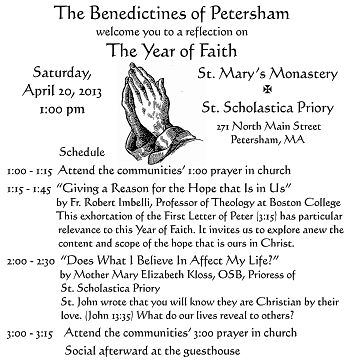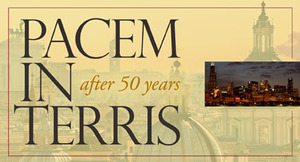Which love story do you live?
13 years ago an essay in the Colombia Magazine appeared in 2000. The archbishop who wrote, “Renewing God’s House” speaks about our standing with the Lord; the gesture of standing is new way of being present, it is a presence which requires us to intellectually, spiritually and affectively present in the very following of the Lord in light of the various gifts He’s given. Jesus Christ asks us to help Him carry the cross, just like he did with Simon, and Benedict, and Francis and Dominic and countless others, to help Him in repairing the house He’s built. The strength in what Archbishop Chaput is talking about is a communal work of standing with Christ, in the midst of sinners, and in setting our face on the Lord in the way He’s proposed. Grace received in Baptism, Confirmation and the Holy Eucharist will sustain us, together, as true brothers and sisters. “Renewing God’s House” is an essay worth reading on Spy Wednesday.
Private notes of Jorge Bergoglio from pre-conclave meetings published
Reading the notes from the pre-conclave meetings of the cardinals meeting in the General Congregation is not usual reading material for most people. One has to admit that it is interesting to know what the cardinals think and what they verbalize with regard to the life of the Church and the proposal for future ministry. Zenit.org published today the notes of Jorge Cardinal Bergoglio (now Pope Francis). Nothing really new except that now we know with better certainty the perspective of the made elected the Supreme Pontiff. The notes follow:
The archbishop of Havana says that a speech given by Cardinal Jorge Bergoglio (now Pope Francis) during the cardinals’ pre-conclave meetings was “masterful” and “clear.”
Cardinal Jaime Lucas Ortega y Alamino spoke of Cardinal Bergoglio’s speech at a Mass on Saturday in Cuba, having returned home from his trip to Rome to bid farewell to Benedict, participate in the conclave, and welcome Francis.
Cardinal Ortega said that Cardinal Bergoglio gave him the handwritten notes of the speech, and the permission to share the contents.
“Allow me to let you know, almost as an absolute first fruit, the thought of the Holy Father Francis on the mission of the Church,” Cardinal Ortega said.
Continue reading Private notes of Jorge Bergoglio from pre-conclave meetings published
Popes who belonged to religious orders
Pope Gregory XVI, a Benedictine monk, made gambling on papal elections punishable by excommunication.
When Jorge Mario Bergoglio was elected the 266th Roman Pontiff he was listed among a rather small and elite group of men who had their intellectual and spiritual formation in religious life. Bergoglio is a member of the Society of Jesus. But who are the others?
Gregory I, Boniface IV, Adeodatus II, Leo IV, John IX, Leo VII, Stephen IX, Gregory VII, Victor, III, Urban II, Paschal II, Gelasius, II, Celestine V, Clement VI, Urban V, Pius VII, Gregory XVI
Honorius II, Innocent II, Lucius II, Adrian IV, Gregory VIII, Eugene IV
Nicholas IV, Sixtus IV, Sixtus V, Clement XIVSecular Franciscans have 2Pius IX, Leo XIII
Innocent V, Benedict XI, Pius V, Benedict XIII
Eugene III, Benedict XII
Paul IV
Francis
Marcel Lefebvre RIP
 Today is the anniversary of death in 1991 of the famed Archbishop Marcel François Marie Joseph Lefebvre founder of the Society of St Pius X (SSPX).
Today is the anniversary of death in 1991 of the famed Archbishop Marcel François Marie Joseph Lefebvre founder of the Society of St Pius X (SSPX).
Passover 2013, Francis united in prayer with the Jewish people
Tonight, 15th of Nissan, begins the annual days prayer remembering the liberation of the captive Jews in Egypt by God. The theological reality of the Passover is not merely relating to events of 3000 years ago, but an active remembrance (liturgically called anamnesis) that God leads us to freedom today: from slavery of sin to the grace of freedom; from being chained to unfaithfulness to the freedom of love and mercy. Christians will hear echoes in what is believed about Jesus and Holy Week. All leavened foods will be destroyed, needed cleaning done, and time for prayer and fasting. Read the Book of Exodus. The ritual mean of the sedar is a mix of biblical narrative, song and friendship. Passover ends on April 2 (in Israel the observance is 7 days, other places it’s 8).
The Holy Father unites himself, and us, with our Jewish brethren:
A few days on from our meeting, and with renewed gratitude for your having desired to honour the celebration of the beginning of my ministry with your presence and that of other distinguished members of the Jewish community, I take great pleasure in extending my warmest best wishes to you and Rome’s entire Jewish community on the occasion of the Great Feast of Pesach. May the Almighty, who freed His people from slavery in Egypt to guide them to the Promised Land continue to deliver you from all evil and to accompany you with His blessing. I ask you to pray for me, as I assure you of my prayers for you, confident that we can deepen [our] ties of mutual esteem and friendship.
Francis
Pope Francis’ books draw on Ignatian spirituality
Have you been wondering what the Pope has published? Well, look no further. L’Osservatore Romano is publishing an article in tomorrow’s edition on Francis’ books. With Pope Francis leading the Church I think there will be a resurgence of Ignatian spirituality –as distinct from “Jesuit spirituality”, inhabiting our Christian lives. I am sure these books will be published in various languages before long.
The first two books in Italian by Jorge Mario Bergoglio were presented on Tuesday, 26 March in the offices of Civiltà Cattolica. They are published by Editrice Missionaria Italiana (Emi): Umiltà, la strada verso Dio (Bologna, 2013, 64 pages, € 6.90, with an afterword by Enzo Bianchi) and Guarire dalla corruzione (Bologna 2013, 64 pages, € 6.90, with an afterword by Pietro Grasso) and are collections of addresses that the Cardinal Archbishop of Buenos Aires gave in 2005 to the faithful of the archdiocese.
Both books draw on the spirituality of St Ignatius of Loyola to describe its deep inner workings and offer solutions to extremely pertinent phenomena such as corruption in both society and the Church, as well as the urgent need for an ecclesial life distinguished by brotherly holiness.
Speakers at the meeting chaired by Fr Antonio Spadaro, editor-in-chief of the Jesuit journal, were Lucetta Scaraffia, an Italian historian, Fr Luigi Ciotti and Lorenzo FazzinI, director of Editrice Missionaria Italiana.
Bergoglio stated:
“Factions fighting to impose the hegemony of their own viewpoint and preferences are fairly common in religious communities, both local and provincial. This occurs when charitable openness to neighbour is replaced by each individual’s own ideas. It is no longer the religious family as a whole which the religious defends, but only the part of it that concerns him. People no longer adhere to the unity that contributes to configuring the Body of Christ, but rather to the divisive, distorting, and debilitating conflict. For formation teachers and superiors it is not always easy to inculcate a sense of belonging to the family spirit, especially when it is necessary to shape inner attitudes, even small ones, but which have repercussions at this level of the institutional body. One of the effective attitudes that must acquire substance in the hearts of young religious is that of ‘self-accusation’, for it is in the absence of this practice that the spirit of separation and division is rooted. It is therefore essential first of all to ban every reference, even an unconscious one, and every kind of pharisaic attitude that presents self-accusation as something puerile or characteristic of the cowardly. Self-accusation, rather, presupposes a rare courage in order to open the door to unknown realities and let others see beyond my appearance. It means removing all our make-up so that the truth may shine through.
The accusation of ourselves (which is only a means) is the basis in which the fundamental option puts down roots: for anti-individualism and for a family and Church spirit which brings us to relate as good children and good siblings, so as to succeed later in being good parents. Accusing ourselves implies a fundamentally communitarian attitude.”
The Annunciation: the beginning of salvation
Today is the beginning of our salvation,
The revelation of the eternal mystery!
The Son of God becomes the Son of the Virgin.
As Gabriel announces the coming of Grace.
Together with him let us cry to the Theotokos:
Rejoice, O Full of Grace,
The Lord is with You!
(Troparion, Tone 4)
Indeed, today is the beginning of salvation history. As St Luke’s gospel (1:26-38) reveals, and as other languages portray the Incarnation, we’ve received “good tidings.” From the moment the angel’s message was received positively by Mary cosmic history has never been the same. March 25 is the solemnity of the Annunciation to the Mary that she’s be the Mother of God (the most Holy Theotokos). And it’s Holy Week followed by Eastertide, the Church will observe this solemn occasion on April 8. Nevertheless, a word or two need to be said about the Annunciation.
Liturgical history tells us that there exists a 2nd century painting of the Annunciation in the catacomb of Priscilla. And more widely celebrated since the 4th century, the Christian community has observed the Annunciation as a solemn day of grace.
Ecclesiastical history bears witness to the Council of Toledo in 656 mentioning the Feast in Spain and then at the Council in Trullo in 692 indicating the Church there having a celebration of the Annunciation even though it was Lent. The Fathers of the Second Vatican Council spoke about the Marian principle of the Church as being fundamental to the life of the Church (see the conclusion of Lumen Gentium), even more important that the Petrine principles because what we believe to be true about the Incarnation.
On the Annunciation, the Knights of Columbus pray for the unborn children and the work of being pro Life.
The feast testifies that God fulfills His promise to send a Redeemer (Genesis 3:15): “I will put enmity between you and the woman, between your seed and her seed; he shall crush your head, and you shall lie in wait for his heel.” What the prophets and teachers of the Law believed and taught the people of Israel, was given by Gabriel’s announcement; and in the Christian dispensation the Fathers of the Church have taught that what is called “her seed” to refer to Jesus. Here is an unmistakable theological view that Jesus is the new Adam, the new tree of life, the new Law, the new Lawgiver, the new face of God.
Continue reading The Annunciation: the beginning of salvation
St Mary’s Monastery (Petersham) hosts Fr Robert Imbelli for a Year of Faith presentation on Hope
Pacem in Terris after 50 years
A Public Symposium in Celebration of the 50th Anniversary of Pope John XXIII’s Encyclical on Establishing Universal Peace on Earth
Thursday, April 4, 2013, 5:00PM – 7:00PM
5 – 7 p.m. EST
4 – 6 p.m. CST
Max Palevsky Cinema, Ida Noyes Hall
University of Chicago
1212 East 59th Street, Chicago, IL 60637
Keynote
Roland Minnerath, Archbishop of Dijon
Respondents
Mary Ann Glendon, Harvard Law School
Joseph Weiler, New York University Law School
Russell Hittinger, University of Tulsa Thursday, April 4, 2013
Presented by
The Lumen Christi Institute for Catholic Faith, Thought, and Culture, the Committee on Social Thought at the University of Chicago, and the Center for Civil and Human Rights at the University of Notre Dame Law School
For more information on other presentations, visit this site.










